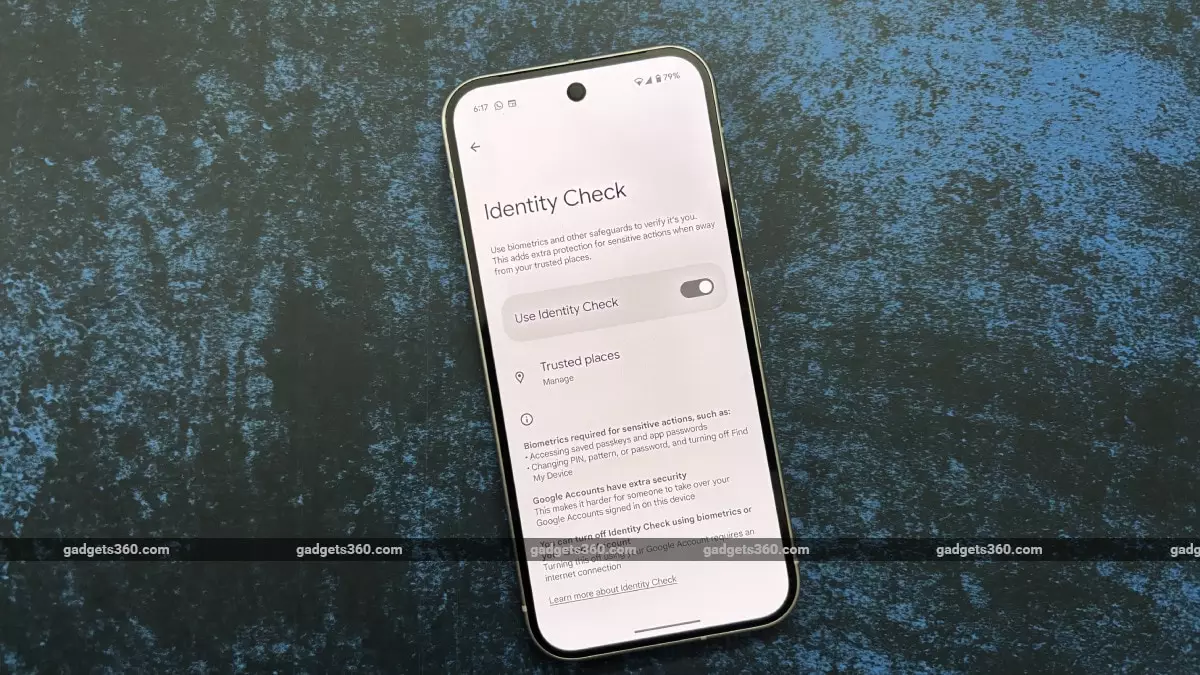Google’s impending rollout of the Identity Check security feature represents a significant evolution in mobile device protection. As smartphone theft becomes increasingly rampant and personal data breaches more prevalent, tech giants must step up their security game. Google’s Identity Check will serve as a bulwark against unauthorized access, mandating biometric verification before any alterations to critical settings on Android devices. This marks not only a technical enhancement but a philosophical shift towards prioritizing user security in a digital landscape fraught with peril.
Identity Check isn’t just a token gesture; it’s a response to a pressing issue facing millions of smartphone users—how to effectively safeguard sensitive information. With statistics indicating a sharp increase in identity theft incidents, Google’s proactive approach is commendable. By enabling a feature that relies on biometric authentication, users will find it increasingly difficult for thieves to seize control of their digital lives, even if they’ve remembered their passcodes. This fundamentally challenges the age-old notion that passwords alone can protect us in an era defined by rapid technological advancements.
Comparative Analysis with Apple’s Stolen Device Protection
Interestingly, Apple’s similar offering, Stolen Device Protection, launched with iOS 17.3, highlights an emerging trend: the push from tech companies to take accountability for user security. However, while Apple has had a head start in this realm, Google’s timely introduction of the Identity Check can provide a competitive edge in their ongoing battle for consumer trust. Does this mean Google is merely playing catch-up, or does it signify a pivotal moment where innovation meets necessary ethics?
The timing of Google’s feature expansion is crucial. As Apple continues to position itself as the leading authority in privacy, Android’s market share risks eroding without similar assurances. If Apple’s users bask in the comfort of knowing their precious data is secure, Android users must be offered the same level of assurance. In that context, Google’s Identity Check can be viewed as a “wake-up call,” compelling all tech companies to enhance their security protocols in a climate where consumer trust hangs by a thread.
Technical Foundations: The Importance of Class 3 Biometric Standards
The technical underpinnings of the Identity Check feature elevate it above basic security measures; it requires devices to support class 3 biometric authentication. This classification is critical because it ensures that the biometric data collected—such as fingerprints or facial recognition—is not only reliable but also resistant to spoofing attempts. The parameters set forth by class 3 standards create a more robust security environment, distinguishing serious security initiatives from subpar imitations.
Moreover, the practical implications of the feature are immense. The requirement for biometric verification when undertaking sensitive tasks transforms user experience and expectation. No longer can unauthorized individuals or opportunistic thieves make superficial changes; the seriousness attached to accessing or modifying user data has escalated. This shift is not merely about appending security measures—it’s about redefining what personalization and accessibility mean in a world increasingly concerned with digital integrity.
User Experience and Autonomy
Another significant aspect of the Identity Check is its user-centric philosophy. The option to disable the feature still requires biometric authentication, safeguarding users from both external threats and their own lapses in judgment. This dynamic interaction promotes vigilant behavior, inherently teaching users more about their digital footprint while empowering them to manage their security proactively. The reliance on user consent is a powerful message that resonates strongly with the ideals of center-left liberalism: enabling individuals to take control of their security rather than reverting to heavy-handed corporate oversight.
However, one can’t overlook the challenges of implementing such protective mechanisms universally across the Android ecosystem. Variability in hardware capabilities and software versions could lead to disparities in user experiences, potentially fracturing the cohesive security narrative that Google aims to create. Yet, if rolled out effectively, the Identity Check could elevate Android devices into a new caliber of security that has, to date, been more synonymous with Apple’s ecosystem.
In a rapidly changing digital environment, the launch of Google’s Identity Check might well be the pioneering act that propels both Android users to a higher standard of personal security and the industry at large towards a future where user privacy is non-negotiable. This isn’t just about technological innovation—it’s a moral obligation that the tech ecosystem must embrace.


Leave a Reply